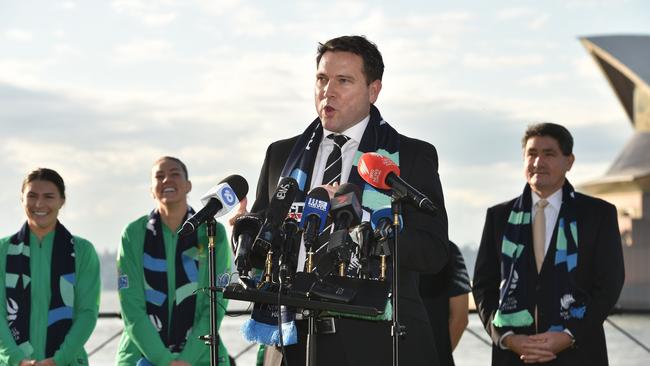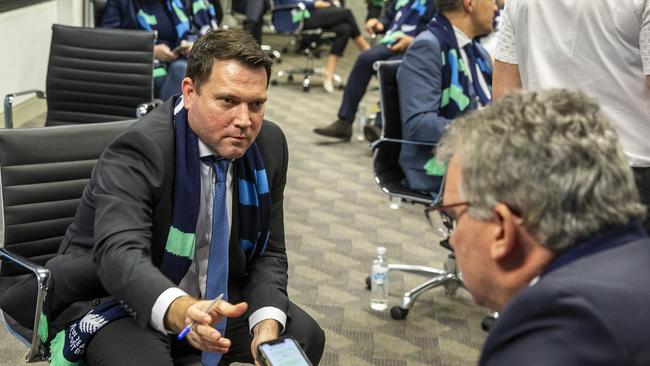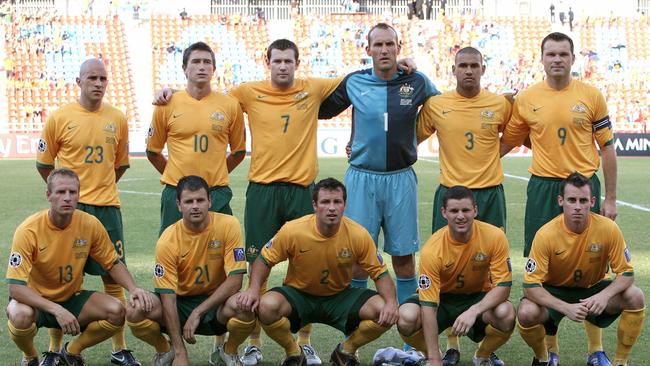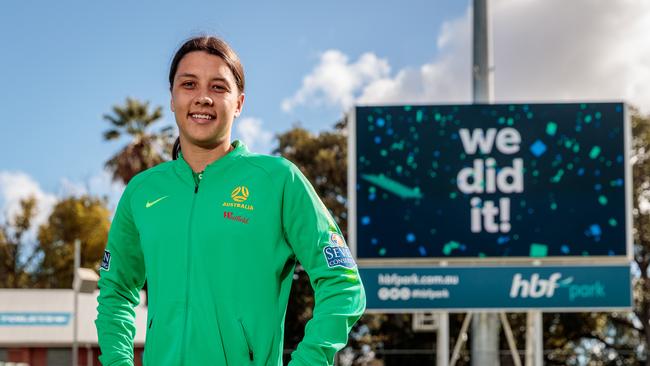FFA CEO James Johnson reveals 11-point plan to transform Australian football
Football Federation Australia has unveiled an incredible 56-page vision for the game which boasts plans for the Matildas becoming World Cup winners and the Socceroos to dominate Asia.

Football
Don't miss out on the headlines from Football. Followed categories will be added to My News.
The ambitious plan to awaken Australian sport’s sleeping giant has been unveiled in an extraordinary 56-page manifesto designed to ‘transform’ the game in Australia.
Football Federation Australia on Thursday delivered the groundbreaking 11-point plan CEO James Johnson believes can transform the very nature of football in this country across the next decade and a half, and unlock the latent potential within.
Within, ambitious goals are outlined of where FFA believes the game needs to be by 2035 – including having the Socceroos be the dominant force in Asia, and a regular top-15 ranked nation in the world, while the hope is that the Matildas will be Olympic or World Cup champions in that period.
Installing a female CEO and Chair, pushing the A-League to be in the top 3 in Asia and the W-League to be top-5 worldwide, and a reputation for developing world class talent, are also among the lofty goals laid out for all to see.
Youth development and grooming coaches will play a huge role, Johnson declared, as will introducing a more rigid transfer system – which has cost the game “millions of dollars” – and knocking down barriers for grassroots players.
Watch European Football with beIN SPORTS and ESPN on Kayo. New to Kayo? Get your 14-day free trial & start streaming instantly >

The growth of the women’s game, too, remains an enormous focus, not least of all because of last week’s historic winning bid to host the 2023 Women’s World Cup with New Zealand and the opportunities that presents.
The ongoing COVID-19 crisis, and the financial burden it has placed upon all parts of the football world, was a catalyst for the need for change and the creation of this document which has drawn on the views of people at all levels of the game in Australia.
“Despite a tumultuous few months, FFA has felt it necessary to consider the direction and future of Australian football,” Johnson said.
“The eleven principles are the next step in not just the rebuild, but the transformation of Australian football.”

Johnson cited the example of powerhouse Germany as a nation that has a streamlined set of ideals which Australia could draw inspiration from – if not necessarily aim to copy.
“They are a country that understands the value of having a strong professional game, they understand the value of having strong national teams and the link between the two, and they understand the value of having a very strong participation base,” he said.
Grassroots and women’s football have been identified as particular areas where Australia can forge its identity in the world game.
“The challenge for Australian football today is to develop a clear identity which truly resonates across the entire spectrum of its football community,” the document reads.
“The identity should embrace its multicultural origins and the diversity of its community.
“It must also be reflective of broader considerations such as Australia’s Indigenous heritage and account for contemporary influences such as new migrants and those which seek refuge in Australia.”
YOUTH DEVELOPMENT
Australian football fans continue to pine for – and may forever – the ‘golden generation’ that boasted the talents of Harry Kewell, Mark Viduka, Mark Schwarzer, Tim Cahill and Lucas Neill.
And while the current crop of Socceroos continues to compete at the highest levels on the world stage, and is currently on track to reach a fifth consecutive World Cup, there have long been concerns about whether a new ‘golden generation’ may ever materialise.

Johnson made it clear that improvements needed to be made in that area, creating clearer pathways and carving out ways to get more gametime for the game’s best developing players.
This will be indelibly linked to the strengthening of a transfer system for Australian clubs who, Johnson believes, have historically been short-changed in deals after helping bring through young stars. Zejlko Kalac’s $1.7 move from Sydney United to Leicester City in 1995 remains a transfer record for an Australian club.
The proposed measures include creating a transfer system that ensures Australian clubs are incentivised to develop players.
“The reality is at the moment, and we haven’t done the numbers, but there would be millions of dollars that have been lost to the game simply because we don’t understand how the system works.
“There’s been players moving overseas and transfer fees and training compensation fees not coming back in.”
Also tying into this is the age-old complaints from parents and weekend warriors about the growing costs of club registrations.
Johnson argued that the cost of registering his kids to the local team, for $190, was cut-price compared to fees in the United Kingdom – but recognised that it remains a big talking point around the country.
THE WOMEN’S GAME
Boasting the Matildas’ star power of Sam Kerr, Ellie Carpenter and Emily van Egmond, and with booming participation numbers and a World Cup on the way, there’s no question the women’s game has never been in a stronger position in this country.
“We are known already to be very strong in this area,” Johnson said proudly.
One of the areas FFA can see improvement in, however, is the global power of the W-League, and investing heavily to lure the world’s best players to the competition.
“It’s affordable now (to buy players), it’s an opportunity,” he said.
“I think players would love to come to Australia because we have a fantastic country, we have the Women’s World Cup.
“(The clubs are) going to have to invest, but there is an opportunity for us to be one of the best leagues in the world, and that’s where we should be aiming for the W-League”

THE A-LEAGUE
Expansion to 16 A-League teams - as well as a complete rebranding of all domestic competitions - is among the boldest proposals to revive the flagging competition
One of popular options to strengthen the domestic game is to revive the ‘marquee player’ system which brought the likes of Alessandro Del Piero, Dwight Yorke and Robbie Fowler down under.
The current crop of A-League talent don’t have quite the same wow factor, and that has been identified as a key path to go down to make the game more attractive to fans.
“Consideration should also be given to a system in which all clubs receive the commercial
benefit of the League attracting one major marquee signing (e.g. players at the level of Zlatan Ibrahimovic),” the report states.
NATIONAL FOOTBALL CALENDAR AND PROMOTION-RELEGATION
FFA would like to see the Australian season aligned with that of the Asian and international calendars, and ‘create a special space for the finals to be played in November each year’.
This wouldn’t just be the A-League and W-League, but all of the competitions which underpin them, opening the door for discussion on the most divisive topic in Australian football – and one of the major differences in how the domestic league is run differently to the big European competitions.
One, or more, goes up? Then some must come down.
Johnson gently suggested an openness to promotion-relegation, if not in a traditional sense – pointing to the Mexican league, which opts for a system where the team that performs worst over six seasons is relegated.
One of the goals would be to “transition away from a Club Participation Agreement framework and introduce a National Club Licensing framework which acts as a principle-based development tool to improve the standards of clubs across Australia,” the statement read.
“This will allow the Australian game to create a tailored system which is relevant and can be
applied to the various tiers of football in Australia.”
THE 11 PRINCIPLES FOR THE FUTURE OF AUSTRALIAN FOOTBALL
1.Build a consistent and strong identity for Australian football which inspires all Australians.
2.Develop a new narrative for football which signifies a fresh start for the game in Australia, successfully ties together all new initiatives and distinguishes it from other sporting codes in the country.
3.Establish an integrated and thriving football ecosystem driven by a modern domestic transfer system.
4.Create a dynamic and engaging football product by optimising competition structures to connect Australian football; promote competitive balance and tension; promote uncertainty of outcome; incentivise sporting achievement; and prioritise the fan experience.
5.Create a world class environment for youth development / production by increasing match minutes for youth players and streamlining the player pathway.
6.Create a strong culture around coach development by emphasising the importance of the role as a skilled position and a vital link in player development.
7.Transition towards a modern, fit-for-purpose governance framework for football in Australia in line with global standards and best-practice sports governance in Australia.
8.Create an operating and governance model for the A-League, W-League and Y-League which is fit for the current circumstances.
9.Ensure that football becomes more open and accessible to the Australian community and that cost does not remain a barrier to participation.
10.Continue the growth of the game by driving participation of women and girls and enhancing existing competition structures to promote player development.
11.Position the Westfield Matildas and the Socceroos as the unifying symbols of the game and heroes who epitomise the Australian football identity to inspire every young Australian regardless of their ability or background
Originally published as FFA CEO James Johnson reveals 11-point plan to transform Australian football


